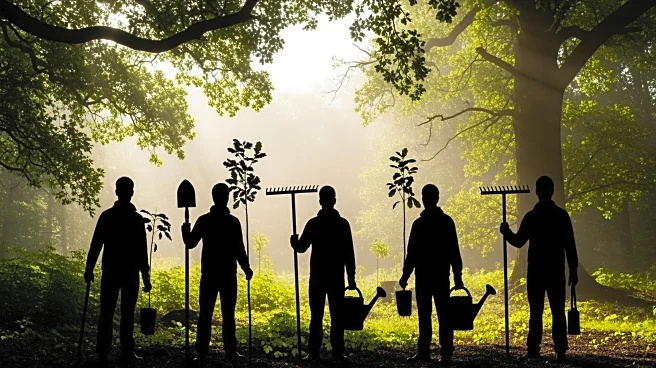What's Happening?
A group of Icelandic foresters from Land og skógur visited Glen Nant oakwoods to gain insights for their forest conservation and restoration program. Iceland, historically covered with downy birch forests,
experienced significant deforestation due to Viking settlement and livestock grazing. The foresters aim to reclaim native woodlands and establish diverse forests for timber yields, carbon sequestration, and recreation. The visit to Glen Nant, where oak is non-native but now viable due to climate change, provided inspiration and practical knowledge. The Icelandic team was allowed to take acorns back to Iceland to aid their efforts in establishing oak groves. This initiative is part of a long-term strategy to increase forest cover in Iceland, including trial planting of oak trees.
Why It's Important?
The visit underscores the importance of international collaboration in addressing environmental challenges. Iceland's efforts to restore its native woodlands are crucial for biodiversity, carbon sequestration, and combating climate change. The introduction of oak trees, facilitated by a warming climate, represents a significant shift in Iceland's forestry practices. Successful restoration could enhance Iceland's ecological resilience and contribute to global environmental goals. The exchange of knowledge between Icelandic and Scottish foresters highlights the potential for shared strategies in forest management and conservation.
What's Next?
Icelandic foresters will continue their efforts to reclaim native woodlands and establish diverse forests, incorporating lessons learned from Glen Nant. The acorns collected during the visit will be planted in Iceland, contributing to the trial of oak groves. Long-term, Iceland aims to increase the prevalence of mixed forests, including oak, across the country. Monitoring and adapting to climate changes will be essential in ensuring the success of these initiatives. Collaboration with international forestry experts may continue to play a role in refining and advancing Iceland's forest restoration strategies.
Beyond the Headlines
The initiative reflects broader environmental and cultural shifts, as Iceland seeks to restore landscapes altered by historical practices. The project may influence public perception and policy regarding land use and conservation. It also highlights the role of climate change in altering ecological possibilities, with warming temperatures enabling new species to thrive in previously unsuitable regions. The cultural significance of reclaiming native woodlands may foster a deeper connection between Icelanders and their natural heritage.










